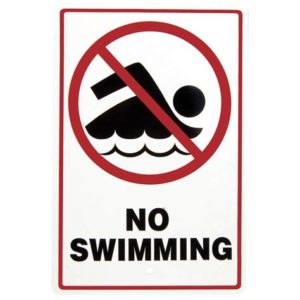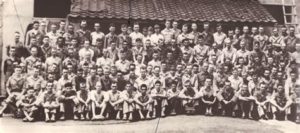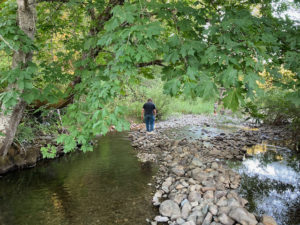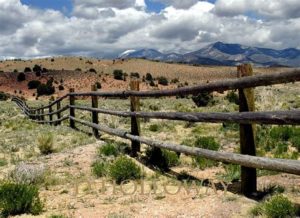“Abstain from all appearance of evil.” 1 Thessalonians 5:22
 When it comes to sin, we sometimes see how close we can come without going over the edge. We flirt with wrong doing supposedly keeping ourselves just out of reach of what someone might call sinful behavior. But that will always be a failing effort, and there are two very important reasons why we should avoid this kind of risky behavior.
When it comes to sin, we sometimes see how close we can come without going over the edge. We flirt with wrong doing supposedly keeping ourselves just out of reach of what someone might call sinful behavior. But that will always be a failing effort, and there are two very important reasons why we should avoid this kind of risky behavior.
The first reason is most apparent. If we play with fire long enough, we are bound to get burned. We seldom jump headfirst into temptation. When I go swimming, I am not one of those who can leap into icy water taking the brunt of the cold all at one time. I am one of those embarrassing slow-pokes who gets in and inch at a time, allowing a little strip of my body to get used to the water and moving slightly so another section can adjust a few minutes later. Eventually, my whole body is ready to go and probably everyone else is ready to go home!
who gets in and inch at a time, allowing a little strip of my body to get used to the water and moving slightly so another section can adjust a few minutes later. Eventually, my whole body is ready to go and probably everyone else is ready to go home!
When it comes to entering into the waters of temptation, very few take a plunge right in. They slowly work their way into it, getting used to things just a little bit at a time. But this is dangerous. Behavior which used to be abhorrent slowly becomes acceptable. We adjust just like the proverbial frog in the boiling water and eventually we find ourselves in a situation we can’t get out of. All along the way, we will have excuses that allow us to go to the next level and then, one day, we are at a place we would have never thought of treading just months earlier.
So we know, by the Word and by experience that playing footsy with sin will get us in big trouble eventually, but there is a second reason we should avoid temptation. Paul tells us to avoid all appearance of evil. Why? Because our actions affect others, even if it is not readily apparent.
If others see our sin, it reflects badly on our Christian walk and that in turn can affect another’s Christian walk or even their desire to become a Christian. We have to decide if the sin in which we are engaged is “fun” enough to cost our witness with others. Is what we are doing worth the risk of influencing someone else away from The Lord Jesus? Is the behavior so rewarding that if it led another astray, it would be worth it? Of course, when we slowly enter into sin, we don’t ask ourselves those questions because self gratification becomes the main goal and we don’t want to be bothered by unnecessary negatives. We don’t want to be confused by the facts.
bothered by unnecessary negatives. We don’t want to be confused by the facts.
Not only is our sinful behavior a bad witness, others will be impacted because they will feel the consequences as well. Anyone who thinks he can be involved in sin without its reach affecting others is in denial. We should avoid sin because it will eventually bring others into its tangled web. There is a saying that “no man is an island,” and I would say that “no sin stays on an island,” as well. Even if we have a secret sin, it will have its effects. It will affect the way we look at others and look at ourselves, treat others and treat ourselves, and that is a given. And, most likely, the sin will eventually raise  its ugly head and be discovered and the domino effect will touch the lives of all those around us. Like a pebble tossed in a pool, the ripples make their way outward.
its ugly head and be discovered and the domino effect will touch the lives of all those around us. Like a pebble tossed in a pool, the ripples make their way outward.
So if falling to temptation is bad for us and for those around us, how do we prevent the slow move to accept more and more into our lives. How do we avoid sin while it is just a flickering flame instead of trying to get free when it is a roaring fire? How do we keep from doing test runs with temptation? If we avoid all appearance of evil, we will assure that we will not reach the point where we are defending our bad behavior. We must intentionally avoid sin if we are to escape its tempting pull.
Here are some steps we can take to make sure we are not slowly entering the  cold pool of sin an inch at a time. First, evaluate our lives. Are things that would have shocked us even months ago passing us by with little notice. Do our minds wander to places they shouldn’t when we are not caught up in an activity? Do we read, watch, or listen to things that are in opposition to righteous living? Do we frequent places or take up friendships that will hinder our Christian growth? On the other hand, do we intentionally spend time with other Christians and involve ourselves in Christian service. If we are like many, we might realize that we are doing things or are avoiding things that are not beneficial to our Christian walk. If that is the case, we will usually add the word “but” right after we admit it (even if we can admit it at all). “I wouldn’t do this normally, but…. or “I would do this, but…” becomes our reason (oops, excuse) for our behavior. People say we fall into temptation like it is all accidental. Unfortunately, it is less of a fall (which seems out of our control) and more of a leap (which we slowly, but purposely initiate).
cold pool of sin an inch at a time. First, evaluate our lives. Are things that would have shocked us even months ago passing us by with little notice. Do our minds wander to places they shouldn’t when we are not caught up in an activity? Do we read, watch, or listen to things that are in opposition to righteous living? Do we frequent places or take up friendships that will hinder our Christian growth? On the other hand, do we intentionally spend time with other Christians and involve ourselves in Christian service. If we are like many, we might realize that we are doing things or are avoiding things that are not beneficial to our Christian walk. If that is the case, we will usually add the word “but” right after we admit it (even if we can admit it at all). “I wouldn’t do this normally, but…. or “I would do this, but…” becomes our reason (oops, excuse) for our behavior. People say we fall into temptation like it is all accidental. Unfortunately, it is less of a fall (which seems out of our control) and more of a leap (which we slowly, but purposely initiate).
 We have all heard the story about the little boy who was told not to swim in the canal, but when he comes home to his father the boy is all wet. When ask why he swam in the canal when we was told not to, he said , “I looked at the canal and looked down at my swimming trunks, and the combination of the two was too tempting.” His father ask why he would even take his swimming trunks, and the boy answers, “Well, in case I was tempted, of course.” We sometimes make all the preparations we need to follow through with temptation, just in case we are tempted. We plan for temptation, but not to avoid it, but to step into it.
We have all heard the story about the little boy who was told not to swim in the canal, but when he comes home to his father the boy is all wet. When ask why he swam in the canal when we was told not to, he said , “I looked at the canal and looked down at my swimming trunks, and the combination of the two was too tempting.” His father ask why he would even take his swimming trunks, and the boy answers, “Well, in case I was tempted, of course.” We sometimes make all the preparations we need to follow through with temptation, just in case we are tempted. We plan for temptation, but not to avoid it, but to step into it.
God will  give us the strength to avoid temptation. As we are told, “There hath no temptation taken you but such as is common to man: but God is faithful, who will not suffer you to be tempted above that ye are able; but will with the temptation also make a way to escape, that ye may be able to bear it.” (1 Corinthians 10:13). If we want to fall, however, we can by ignoring the strength He gives us. So for the sake of others and for our own sake, we must stay out of the “sin” pool. There are probably signs somewhere that say, “Danger. No Swimming,” but we need to look for the signs before we think about getting into the water.
give us the strength to avoid temptation. As we are told, “There hath no temptation taken you but such as is common to man: but God is faithful, who will not suffer you to be tempted above that ye are able; but will with the temptation also make a way to escape, that ye may be able to bear it.” (1 Corinthians 10:13). If we want to fall, however, we can by ignoring the strength He gives us. So for the sake of others and for our own sake, we must stay out of the “sin” pool. There are probably signs somewhere that say, “Danger. No Swimming,” but we need to look for the signs before we think about getting into the water.

























